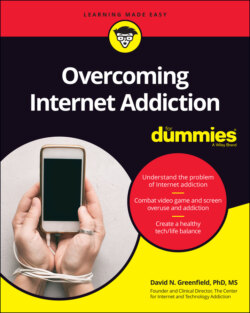Читать книгу Overcoming Internet Addiction For Dummies - David N. Greenfield - Страница 25
Exploring self-help options
ОглавлениеSelf-help options (covered in Chapter 12) have always been a substantive part of any addiction recovery and treatment plan. The most well-known is Alcoholics Anonymous, but there are 12-step and recovery/support programs for nearly every addiction; there are even specific support groups for pornography and sex addiction, including Sex and Love Addicts Anonymous, Sex Addicts Anonymous, and Sexaholics Anonymous. There are also many support and self-help groups for Internet and technology addiction. Groups like Game Quitters, OLG-Anon (On-Line Gamers Anonymous), and others that focus on video gaming and other forms of screen use can be useful, but beware that many of these groups are themselves online. Some might argue that this defeats the purpose, but my experience suggests that some help is always better than no help, even if it’s online. (COVID also gave us new reliance on the utility of telemedicine mental health and addiction treatment.)
Self-help books and resources can be invaluable in making desired changes in any behavior or addiction. When I first started my work in Internet addiction in the late 1990s, only one self-help book (Caught in the Net, published in 1998 by Dr. Kimberly Young) was available, and my book Virtual Addiction was the second, published in 1999. Now, literally dozens of books and resources have been written, and a great deal of medical and scientific research has been conducted on the subject. We know a lot more about this new addiction than we did 25 years ago (see Chapter 12 for more on self-help strategies).
